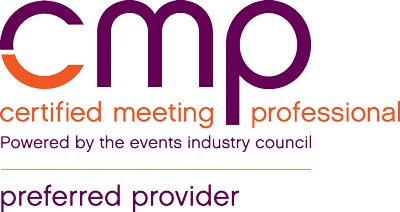
Virtual Event & Meeting Management Certificate OD
Course Overview
Today, event & meeting management professionals are expected to have the skills necessary to plan and execute both live and virtual/digital events. This course is designed for industry professionals looking to build on their existing event management skillset and experience by learning the fundamentals needed to plan and manage virtual/digital events.
LEARNING OUTCOMES
- Articulate the critical differences between planning a live event and virtual/digital event
- Develop a virtual/digital event strategy that includes key components unique to planning virtual/digital events
- Explore requirements for human resources, vendors, public relations, digital platforms, related technology, data collection & analytics, and data security
- Develop a virtual/digital event program that provides a return on investment to key stakeholders while delivering an engaging virtual/digital experience for attendees
Scroll down to see more details including the weekly outline.
 Event Leadership Institute has been approved by the Events Industry Council (EIC) as a Preferred Provider of continuing education on all professional development certificate courses, which qualifies for CMP continuing education credit. Determination of continuing education credit eligibility or Preferred Provider status does not imply EIC’s endorsement or assessment of education quality.
Event Leadership Institute has been approved by the Events Industry Council (EIC) as a Preferred Provider of continuing education on all professional development certificate courses, which qualifies for CMP continuing education credit. Determination of continuing education credit eligibility or Preferred Provider status does not imply EIC’s endorsement or assessment of education quality.

Learn From an Industry Expert
As a first generation personal computer user since the age of 6, technology is part of Brandt’s DNA. Combine that DNA with a degree in Technical Theatre and a core in Psychology, add in almost 20 years experience in the meetings and events industry, and you get a powerful event technology cocktail.
In addition to being published on numerous websites such as CorbinBall.com, EventManagerBlog.com, and the Convention Industry Council, he has landed articles in trade publications such as Meetings and Conventions Magazine and Insurance & Financial Meetings Management Magazine. He’s spoken at various industry events such as Collinson Collaborate, BizBash’s Elevate, MPI’s World Education Congress, FICP’s Education Forum, Event Camp (London, Chicago, and Middle East), and even a one week intensive for government ministers and guests on producing large scale events in Turkmenistan.
He currently teaches many public and private classes through the Event Leadership Institute, and is the owner of Event Technology Consulting, an appropriately named company that provides meeting and event technology consulting services.
View Brandt's ProfileWeek 1: Introduction & Strategic Planning
- Understanding key differences between in-person, hybrid and virtual events
- Types of virtual events including; online events, online meetings, education sessions, webinars, and more
- Moving beyond webinars to a truly online event
- Developing a strategy for a virtual online events; Setting goals and objectives; Reviewing revenue and marketing strategy; Sponsorship & advertising strategy; Ticket sales; Content strategy
- Determining ROI and measurement criteria (what data do you want to collect and why)
- Understanding your audience (technological limitations, experience and strengths)
- Getting buy-in from stakeholders
- Competitive analysis
- Virtual event budgeting and important considerations
Week 2: Staffing, Vendors, Marketing & Sponsorship
- Determining your staffing and vendor needs
- Sourcing subject matter experts
- Preparing and training subject matter experts for digital delivery of their content and presentations
- Training staff to work in a digital environment
- Setting up a support strategy for attendees, vendors, speakers and staff (so people can get help fast when they need it, and it doesn’t distract from the event – phone, email, live chat, text, help centre pages, etc.)
- Making the switch from in-person to virtual without losing your audience
- Demonstrating value of a virtual event
- Marketing yourself to differentiate from competition including free alternatives such as YouTube
- Developing a marketing plan (and how it may be different than an in-person event)
Week 3: Developing A Digital Event Program
- Keeping attendees engaged through strategically planned activities and initiatives including polls, virtual hosts and quality production
- Establishing social etiquette and norms
- Developing a frustration-free, easy to use digital environment including navigation, schedules, registration, etc.
- Ideas for virtual event formats (types of options available – social, networking, education, entertainment, roundtable, forums, etc.)
- Creating opportunities for people to connect similarly to in-person events
- Developing a virtual program with the human component in focus (scheduling breaks, opportunities for questions and engagement, variations of delivery formats / styles, virtual breakout rooms, networking, timed meeting rounds,etc)
- Understating the basic psychology of how people consume content, engage, learn and the effect on their retention and engagement
- Virtual event program alternatives: Expos and tradeshows, entertainment events, fundraisers, etc.
- Risk management / analysis and contingency plans
Week 4: Virtual Event Technology & Online Event Accessibility
- Introduction to accessibility and inclusivity in online events
- Exploring captioning and transcription technology uses and best practices
- Understanding the use of sign language interpretation and integration within online events
- Preparing and delivering inclusive online event engagement features, websites, presentations, and language
- Understanding the various technological options available from small to large events (streaming, full virtual conference apps, internet and bandwidth, encoding, video conferencing such as zoom, online sales pages, registration, payment gateways, metrics, data collection, etc.)
- Preparing your presenters (what technology options do they have / what do you require – for example: Skype vs. studio with professional cameras – audio, video gear, lighting, backdrops, etc)
- Technology limitations
- Technological risk management, redundancy and backup plans
- Technology considerations for the home or small office virtual event studio
Week 5: Data, Analytics & Security
- Understanding what, how and why to collect data (determining what is relevant to collect / only collecting what you actually need)
- Review options for measurement data that can be collected
- Connecting post-event analytics to the event’s goals and objectives to demonstrate ROI
- Tools that can be used for data collection as well as analysis
- Understanding and interpreting measurement results
- Security of data collected including privacy requirements and GDPR
- Credit card data and processing
- Speaker agreements for virtual events (differences from in-person events)
- Terms & conditions, policies for attendees as well as enforcement during the event (removal for abusive behavior, refunds, cancellation, speaker substitutions, technical errors, minimum requirements for technology in order to attend, copyright, public viewing of content – for example, can one registration cover 12 people in a boardroom watching sessions, etc)
Week 6: Virtual Event Execution
- Production schedules in the virtual event environment
- Team communication
- Managing vendors, speakers and support teams
- Coordinating virtual sessions and activities
- Monitoring activities including attendance, engagement, complaints, questions, technical glitches / quality, content delivery, etc.
- Post-event management activities (and how they might be different from an in-person event)
- Putting it all together / developing the overall virtual event plan
- Virtual event plan components
- Communicating your plan to stakeholders
Assessments & Grading
50% – Quizzes (80% pass required for each. You can take each quiz up to three times.)
50% – Final Exam (with minimum pass at 75%)
Minimum course passing grade: 75%
What students say about ELI certificate courses
-
"“At such a critical time in the complete disruption of our world and the meetings industry, where most days we are drinking from a fire hose, this course helps to set the stage and give you the skills and confidence to structure and deliver a virtual event for your organization. I highly recommend taking your uneasy energy and putting it towards something productive, register for this course and skill up.”"
Beth H.AAOMS -
"“What I love about this course is how at its heart Brandt, and the other people at the Event Leadership Institute, understood that the goal is not to teach us to create online, or the online aspects of hybrid events, but to help us understand how to gather people for a purpose more effectively no matter what the circumstances. Thus, the course broadens your perspective on the meaning of events, and more importantly live events.”"
Adam H. -
"“The VEMM class was extremely beneficial to me since the very first class. I was able to use the knowledge gained immediately and it’s made me the go to person with my clients when looking for virtual event answers.”"
Joanna L., CMPBoomtown Events -
"“As event planners face a very uncertain, scary, and changing time, ELI – and the highly knowledgeable instructor, Brandt Krueger – stepped in quickly with a valuable solution – the Virtual Event & Meeting Management course. Not only did I learn ways in which to pivot from live to virtual events, but I was also given direction in my career at a time when I felt powerless. I am now now armed with the skills and information to help my clients move forward.” "
Carri F.A Closer Look Events -
"“This course gave me what I need to help my organization dive into virtual events. It was paced perfectly–short segments, with just enough information to keep the content digestible. Brandt is great teacher–engaging and able to break down complex information, and incorporated some fabulous guest speakers. I highly recommend investing in this course to get you started in virtual events!”"
Kristen G.NIRSA: Leaders In Collegiate Recreation -
"“My experience in the Event Leadership Institute’s Virtual Event & Meeting Managment Course has been truly transformational for me from a meeting and event perspective. The course content, ‘Live’ Sessions and forums not only provided a wealth of virtual event information, but new found connections with industry leaders and professionals from this inaugural class that I will treasure and continue to develop. Brandt and the entire ELI team are engaging, thought provoking and true mentors throughout the entirety of the course. I would definitely recommend this course to my industry colleagues!”"
Jeff S., CMPPreferred Events -
"“I recently attended and got my VEMM Certification through Events Leadership Industry Institute. I found the curriculum and instructor Brandt to be great. The course gives pertinent information, good practice quizzes and good review before the Exam. I am a CMP and would recommend it for the transition to virtual events. Additionally, I took the Technical Meeting & Event Production Certification. I learned a great deal from this course. Good luck.”"
Peter T., CMP, CMSPVEMM Director , Athletics - Special Events -
"“I have literally put everything I’ve learned about virtual events to immediate use. My company cancelled all of our global live events this year and in 3 months, pivoted our entire event portfolio to a series of 7 monthly virtual experiences through December.”"
Shelly B. -
"“Many thanks to the Event Leadership Institute for great content, an industry-leading instructor, and the opportunity to network with my peers. I learned so much from the meetings & events leaders who were our guest speakers (and the guest entertainers at our graduation ceremony!) and can’t wait to put this knowledge to good use.”"
Beth C.Director of Conference Services | Virtual Event Manager | Senior Meeting Manager

The PCMA Institute stands behind all of its content. If you feel you didn't learn what you expected to in this course, just let us know within 30 days of your last lesson and we'll give you a full refund. Click here to view our refund policy and full terms & conditions.
Ready to get started?
Feel free to get in touch with your questions

